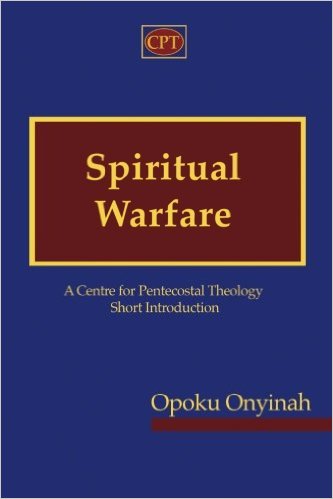Opoku Onyinah: Spiritual Warfare
 Opoku Onyinah, Spiritual Warfare: A Centre for Pentecostal Theology Short Introduction (Cleveland, TN: CPT Press, 2012), 196 pages.
Opoku Onyinah, Spiritual Warfare: A Centre for Pentecostal Theology Short Introduction (Cleveland, TN: CPT Press, 2012), 196 pages.
The Centre for Pentecostal Theology (CPT) Press is initiating an ongoing series of “short introductions”. To date they include the present volume by Onyinah under review and Lee Roy Martin, Fasting: A Centre for Pentecostal Theology Short Introduction (2014). Several others are expected to follow in due time. The Centre for Pentecostal Theology is a residential library dedicated to facilitating the conception, birth, and maturation of constructive Pentecostal Theology across the theological disciplines. Obviously, CPT Press is the publishing arm of that same endeavor. (In the interest of full disclosure, I have previously published with CPT but not in the series under discussion.) The Series Preface explains that these short introductions “offer a distinctively Pentecostal perspective on various topics that are of relevance to the movement.” Further, they “are designed to introduce the reader to the topic at hand while not overwhelming him or her with all the secondary literature.” To be clear, “The goal is a straightforward introduction with helpful assessments by leading scholars in the tradition.” We may approach Onyinah’s Spiritual Warfare from this declared context. However, a reading of Onyinah indicates he has his own contextual concerns as well, which nevertheless appear complementary with those of CPT without necessarily completely contained therein.
Professor Opoku Onyinah is an Apostle of the Church of Pentecost (COP). He holds a Doctor of Philosophy in Theology from the University of Birmingham (United Kingdom). Currently, he is the Chairman of The Church of Pentecost. The Church of Pentecost originated in Ghana but now claims 20,000 congregations worldwide with more than three million members. Given Onyinah’s diverse background, it will not be too surprising to discern in Spiritual Warfare administrative and pastoral concerns articulated alongside biblical and theological scholarship. Indeed the Introduction affirms an intention to address laity, clergy, and academia.
Spiritual Warfare is organized in four sections: Part One: The Nature of Spiritual Warfare, contains three chapters surveying the history of demonology in Pentecostalism; Part Two: Redefining Spiritual Warfare, contains two chapters articulating the importance of the life and victory of Jesus Christ for demonology; Part Three: The Devil’s Scheme: Strongholds, has eight chapters identifying specific areas of demonic activity; and, Part Four: The Weapons of our Warfare, has thirteen chapters (including the Conclusion) which lift up resources available to believers in resisting and overcoming demonic powers.
As implied earlier, Onyinah’s Spiritual Warfare is very contextual. It draws heavily on the experiences of COP believers and churches in Ghana and similar locales. Since African Christianity, and especially African Pentecostal Christianity, has a distinctive appreciation and emphasis for the reality of the demonic, this contextualization is a decided strength of the work. Global Christianity can learn much here that can be of benefit for many other contexts. However, it is also the case, as it perhaps always is, that one context does not necessarily transfer to another in a straight line, so to speak. Readers from international contexts will likely wish to appropriate particular themes in a somewhat selective manner.
Spiritual Warfare has administrative insight, pastoral concerns, and academic depth. Often these are intertwined together on the same page or even the same paragraph. I found it interesting that Onyinah brings these diverse agendas together in ways that are often mutually enriching and challenging simultaneously. I imagine that pastors and laypeople will be stretched by the academic theological considerations. I also imagine that academicians will be stretched by the pastoral applications. And I am sure both will be enriched. Generally, it works well.
Spiritual Warfare indulges in some sweeping generalizations. For example, it castigates postmodernism without bothering to understand it or engage it. Accordingly, it misses sometimes. It also makes assumptions about praise and worship that fit more with populism than Biblicism. And it is quite selective in its list of categories of demonic activity, focusing on individual fetishes and mostly ignoring social atrocities. Admittedly, these features may be—to an extent, at least—elements of the contextualization mentioned earlier. Or they may simply be due to the creative attempt to accomplish so much on several different levels. However, the work would be stronger with more care in such conversations.
Perhaps the greatest value in this volume is that it addresses the topic of spiritual warfare at all. Or at least that it takes the topic seriously. Many modern theologians avoid the topic (even Pentecostals) or approach it only in abstract form (Tillich) or primarily as institutional expressions (Wink). Onyinah takes the topic seriously and addresses it with theological credibility from a historic Pentecostal perspective. To an extent, this text may help to authenticate and legitimate Pentecostal theological discussion of demonology. Overall, I would certainly recommend Spiritual Warfare to readers—as Onyinah intends—from the Church and the Academy. Furthermore, if Spiritual Warfare by Opoku Onyinah (and Fasting by Lee Roy Martin) is a representative foretaste of CPT’s Short Introduction Series, one can only hope and pray that further volumes will be forthcoming soon and frequently.
Reviewed by Tony Richie


